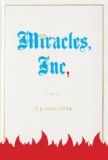Summary | Excerpt | Reviews | Read-Alikes | Genres & Themes | Author Bio

Infused with the lyricism and take-no-prisoners storytelling for which T.C. Boyle is justly famous, this is a surprisingly rich, allusive, and non-sentimental look at the ideals of the 60's generation and their impact on today's radically transformed world.
A brilliant and vividly rendered tale of ordinary people in the throes of idealism, passion, and sub-Arctic temperatures at a moment when our world changed forever.
T.C. Boyle has proven himself to be a master storyteller who can do just about anything. But even his most ardent admirers may be caught off guard by his ninth novel, for Boyle has delivered something completely unexpected: a serious and richly rewarding character study that is his most accomplished and deeply satisfying work to date.
It is 1970, and a down-at-the-heels California commune has decided to relocate to the last frontier—the unforgiving landscape of interior Alaska—in the ultimate expression of going back to the land. The novel opposes two groups of characters: Sess Harder, his wife Pamela, and other young Alaskans who are already homesteading in the wilderness and the brothers and sisters of Drop City, who, despite their devotion to peace, free love, and the simple life, find their commune riven by tensions. As these two communities collide, their alliances shift and unexpected friendships and dangerous enmities are born as everyone struggles with the bare essentials of life: love, nourishment, and a roof over one's head.
Drop City is not a satire or a nostalgic look at the sixties, though its evocation of the period is presented with a truth and clarity that no book on that era has achieved. This is a surprising book, a rich, allusive, and nonsentimental look at the ideals of a generation and their impact on today's radically transformed world. Above all, it is a novel infused with the lyricism and take-no-prisoners storytelling for which T.C. Boyle is justly famous.

If you liked Drop City, try these:

by Lisa Grunwald
Published 2011
Filled with unforgettable characters, settings, and action, The Irresistible Henry House portrays the cultural tumult of the mid-twentieth century even as it explores the inner tumult of a young man trying to transcend a damaged childhood.

by T. J. Forrester
Published 2011
Vernon L. Oliver, still a young man, is waiting for the death penalty. When his attorney suggests he write an autobiography to generate funds to cover legal fees incurred during the appeals process, Vernon sits down to pencil and paper and begins his narrative.